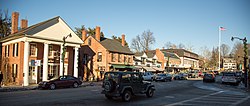Concord, Massachusetts
| Concord, Massachusetts | ||
|---|---|---|
| Town | ||

View of Concord's Main Street in December
|
||
|
||
| Motto: Quam Firma Res Concordia (Latin) "How Strong Is Harmony" |
||
 Location in Middlesex County in Massachusetts |
||
| Location in Middlesex County in Massachusetts | ||
| Coordinates: 42°27′37″N 71°20′58″W / 42.46028°N 71.34944°WCoordinates: 42°27′37″N 71°20′58″W / 42.46028°N 71.34944°W | ||
| Country | United States | |
| State | Massachusetts | |
| County | Middlesex County | |
| Settled | 1635 | |
| Incorporated | 1635 | |
| Government | ||
| • Type | Open town meeting | |
| Area | ||
| • Total | 25.9 sq mi (67.4 km2) | |
| • Land | 24.9 sq mi (64.5 km2) | |
| • Water | 1.0 sq mi (2.5 km2) | |
| Elevation | 141 ft (43 m) | |
| Population (2010) | ||
| • Total | 17,669 | |
| • Density | 680/sq mi (260/km2) | |
| Time zone | Eastern (UTC-5) | |
| • Summer (DST) | Eastern (UTC-4) | |
| ZIP code | 01742 | |
| Area code(s) | 351 / 978 | |
| FIPS code | 25-15060 | |
| GNIS feature ID | 0619398 | |
| Website | www.concordma.gov | |
Concord (/ˈkɒn.kɔɹd/, or locally /ˈkaŋ.kəɹd/) is a town in Middlesex County, Massachusetts, in the United States. At the 2010 census, the town population was 17,668. The United States Census Bureau considers Concord part of Greater Boston. The town center is located near where the confluence of the Sudbury and Assabet rivers forms the Concord River.
The area which became the town of Concord was originally known as Musketaquid, an Algonquian word for "grassy plain". It was one of the scenes of the Battle of Lexington and Concord, the initial conflict in the American Revolutionary War. It developed into a remarkably rich literary center during the mid-nineteenth century. Featured were Ralph Waldo Emerson, Nathaniel Hawthorne, Bronson Alcott, Louisa May Alcott and Henry David Thoreau, all of whose homes are preserved in modern-day Concord. The now-ubiquitous Concord grape was developed here.
The area which became the town of Concord was originally known as "Musketaquid", situated at the confluence of the Sudbury and Assabet rivers. The name Musketaquid was an Algonquian word for "grassy plain", fitting the area's low-lying marshes and kettle holes. Native Americans had cultivated corn crops there; the rivers were rich with fish and the land was lush and arable. However, the area was largely depopulated by the smallpox plague that swept across the Americas after the arrival of Europeans.
...
Wikipedia


